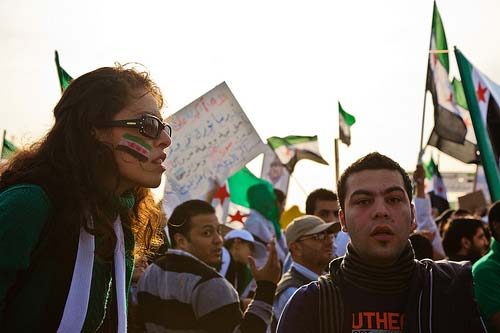
Syrian opposition groups agreed last night in Doha to move forward against the government of President Bashar Al-Assad under a new leader.
The groups elected Ahmed Muaz al-Khatib, the former imam of the Ummayad mosque in Damascus, as president of the new National Coalition for Revolutionary Forces, and named prominent Syrian businessman Riad Seif and female activist Suhair Al-Atassi as its deputies.
Qatar had sequestered leaders of opposition groups in exile and commanders from rebel groups on the ground in Syria at the Sheraton Doha hotel for four days in order to come to an agreement. Earlier in the week, the less-representative Syrian National Council met here to try to reform itself ahead of the weekend meeting.
Hillary Clinton, the US Secretary of State, called Qatari Prime Minister Hamad bin Jassim Al Thani yesterday to congratulate him on his role in securing a new Syrian leadership, Qatar News Agency reports.
Sheikh Hamad bin Jassim, who is also Qatar’s foreign minister, meanwhile, has said the international community must support Syria, and the new opposition coalition. “This work has ended but the next step is more important,” he told reporters.
DOUBTS CONTINUE
Despite Qatar’s public pledge of support, skepticism remains that the new group is ready for the daunting task as it looks to gain international recognition. The Wall Street Journal‘s Nour Malas reports:
It faces a challenge in controlling the sprawling patchwork of rebel militias and councils fighting regime forces and, in some parts of the country, already governing rebel-held areas. And the new coalition could flounder in the coming days as it finalizes its administrative bodies.
Michael Stephens, a Doha-based analyst for the Royal United Services Institute, has expressed greater doubts, calling the Syrian meeting “a lesson in time wasting.”
Aside from a separate United Nations-backed plan to create an inclusive transitional government in Syria, he says the new opposition body has bigger issues:
There is … the inescapable problem of fighting on the ground bearing no relation to the politicking going on outside it.
The five star luxury of the Sheraton is hardly comparable to the destroyed and broken cities and towns that are now home to Syrians unable to flee from the unending violence.
I doubt those fighting street battles in Idlib really have much to say to Syrian exiles enjoying free lunches and dinners at Qatar’s expense.
Thoughts?
Credit: Photo of anti-Assad protesters in Qatar earlier this year by Omar Chatriwala







